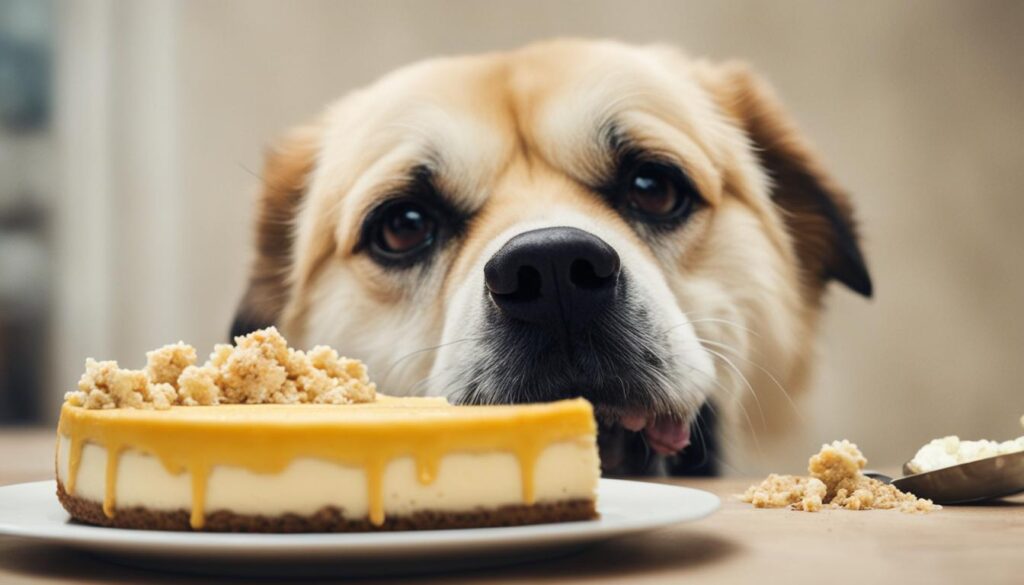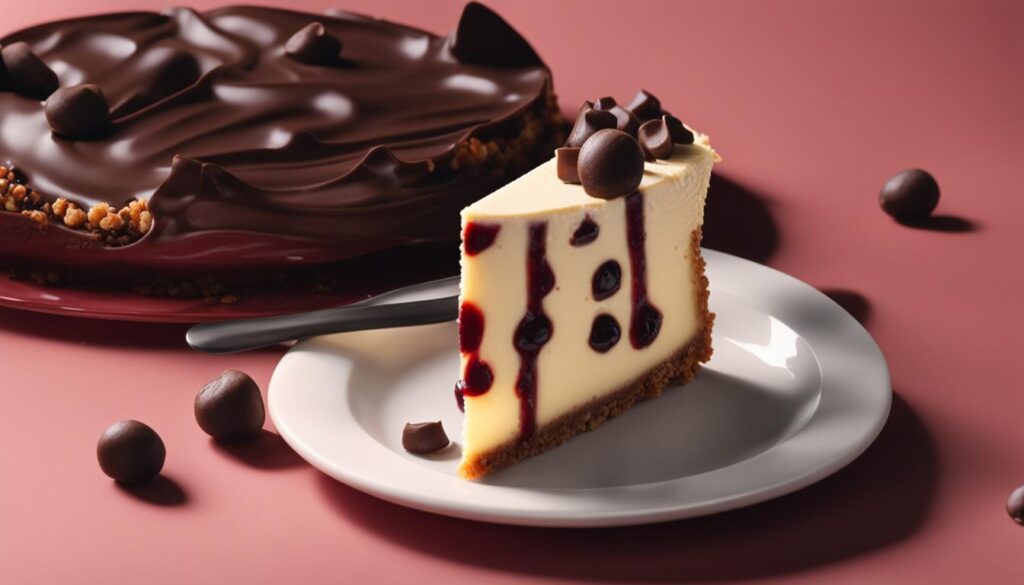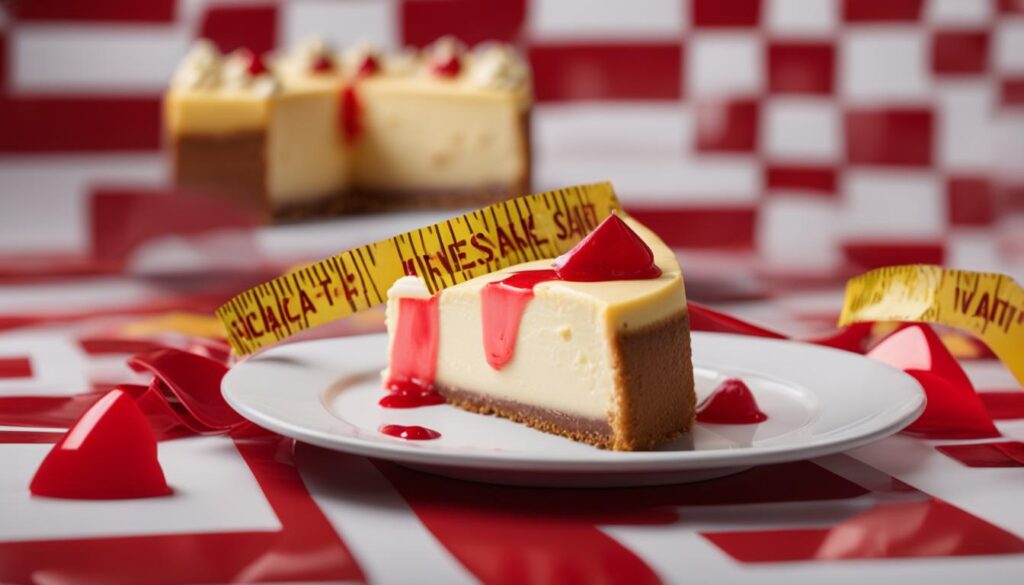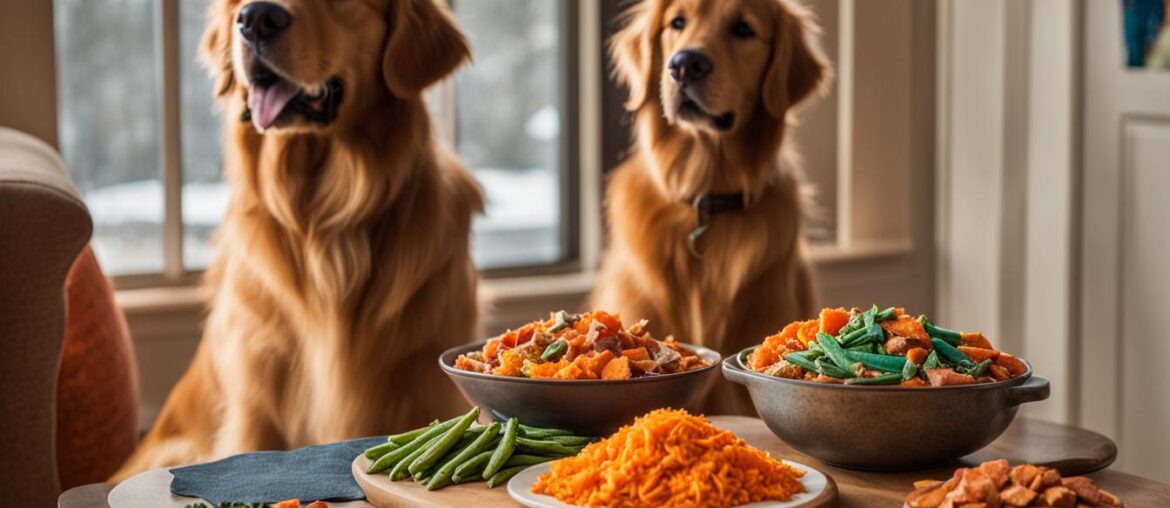As a dog owner, it’s natural to want to share delicious treats with your furry friend. But when it comes to cheesecake, can dogs indulge in this creamy dessert? Unfortunately, the answer is no. Feeding cheesecake to dogs is not recommended. While it may be tempting to share a slice with your canine companion, there are several reasons why dogs should steer clear of this dessert.
The first concern is lactose intolerance. Many dogs, like humans, are lactose intolerant, meaning they lack the enzyme lactase needed to break down the lactose present in dairy products. Cheesecake is made with cream cheese, a main ingredient that contains lactose. Feeding cheesecake to lactose-intolerant dogs can lead to digestive issues such as diarrhea, vomiting, and abdominal discomfort.
Another issue with cheesecake is its high sugar content. Dogs don’t metabolize sugar the same way humans do, and excessive sugar intake can lead to weight gain, obesity, and an increased risk of health problems such as diabetes and heart conditions. Additionally, the sugar in cheesecake can contribute to dental issues in dogs, as they are unable to clean their own teeth. Regular consumption of cheesecake can increase the risk of dental disease and potentially lead to decreased appetite and malnourishment.
Furthermore, certain ingredients commonly found in cheesecake can be toxic to dogs. Chocolate is highly toxic and can cause symptoms ranging from mild gastrointestinal upset to more severe effects like seizures and even death. Raisins, another potential ingredient, can also be harmful to dogs and may lead to kidney failure. It’s crucial to be aware of these toxic ingredients and avoid feeding cheesecake to dogs altogether.
Instead of cheesecake, opt for healthier alternatives that are safe for dogs. There are plenty of dog-friendly desserts and treats available, such as homemade frozen banana popsicles or treats made with dog-safe ingredients like peanut butter, pumpkin, or yogurt. These alternatives provide a tasty indulgence without the risks associated with cheesecake.
Key Takeaways
- Cheesecake is not recommended for dogs due to lactose intolerance and high sugar content.
- Feeding cheesecake to dogs can lead to digestive issues, obesity, dental problems, and potential toxicity from ingredients like chocolate and raisins.
- Healthy alternatives, such as frozen banana popsicles or treats made with dog-safe ingredients, are a safer option for dogs to enjoy.
- Always consult with a veterinarian for specific dietary recommendations for your dog, including suitable treats and desserts.
- Prioritize your dog’s health and well-being by avoiding feeding them cheesecake and opting for safe, dog-friendly alternatives.
Why Cheesecake Is Not Recommended for Dogs

Feeding cheesecake to dogs can be extremely harmful to their health. There are several reasons why dogs should not consume cheesecake, and it is important for pet owners to be aware of the dangers involved.
The Dangers of Sugar and Excess Calories
One of the main reasons why cheesecake is problematic for dogs is its high sugar and calorie content. Dogs are not designed to handle excessive amounts of sugar, and consuming sugary treats like cheesecake can lead to weight gain, obesity, and potential health issues such as diabetes and heart conditions. The excess calories in cheesecake can quickly add up and contribute to unhealthy weight gain in dogs.
The image below highlights the detrimental effects of sugar and excess calories on dogs:
Cream Cheese and Lactose Intolerance
Cheesecake contains cream cheese as a primary ingredient, which can cause discomfort and digestive issues in dogs with lactose intolerance. Many dogs lack the necessary enzyme, lactase, to break down lactose in dairy products. Feeding dogs cheesecake can result in gastrointestinal problems such as diarrhea, gas, and stomach upset due to their inability to digest lactose effectively.
Other Bad Ingredients in Cheesecake
In addition to sugar and cream cheese, cheesecake often contains other ingredients that are harmful or toxic to dogs. Chocolate and raisins, for example, are commonly added to cheesecake recipes but can be extremely toxic to dogs, leading to symptoms such as vomiting, diarrhea, and even kidney failure. It is crucial to avoid feeding cheesecake to dogs to prevent any accidental ingestion of these dangerous ingredients.
Risks of Feeding Cheesecake to Dogs
Feeding cheesecake to dogs presents multiple risks to their health. The high sugar and calorie content can contribute to obesity and related health issues, and the cream cheese can cause digestive discomfort in dogs with lactose intolerance. Additionally, the presence of chocolate and raisins in cheesecake poses a serious risk of toxicity. It is best to avoid feeding cheesecake to dogs altogether and opt for healthier alternatives that are safe and suitable for their digestive systems.
In summary, the dangers of cheesecake for dogs are primarily due to its high sugar and calorie content, the use of cream cheese, and the potential presence of toxic ingredients. It is crucial for pet owners to prioritize their dogs’ well-being by avoiding feeding them cheesecake and opting for safer and healthier alternatives.
The Risks of Sugar and Excess Calories in Cheesecake

Sugar and excess calories in cheesecake can have negative impacts on dogs’ health. Dogs consuming more carbohydrates than they need can lead to weight gain and obesity. Excess weight can make it difficult for dogs to exercise, leading to a sedentary lifestyle that increases the risk of diabetes and heart conditions. Additionally, sugar can contribute to dental disease in dogs. Since dogs are unable to clean their own teeth, the consumption of sugary foods like cheesecake can accelerate plaque and tartar buildup, leading to dental issues such as tooth decay and gum disease. Dental issues can not only cause discomfort for dogs but also lead to decreased appetite and malnourishment if not addressed.
As a responsible pet owner, it is crucial to be aware of the risks associated with sugar and excess calories in dogs’ diets. Avoiding foods like cheesecake that are high in sugar and calories can help prevent obesity, dental issues, and other health problems in dogs. Instead, focus on providing a balanced diet tailored to your dog’s nutritional needs. Regular veterinary check-ups can also help identify any potential health concerns and ensure your dog maintains a healthy weight and optimal dental health.
| Risks of Sugar and Excess Calories in Dogs | Preventive Measures |
|---|---|
| Weight gain and obesity | Provide a balanced diet with appropriate portion control. Regular exercise to maintain a healthy weight. |
| Increased risk of diabetes and heart conditions | Avoid feeding sugary and high-carbohydrate foods. Consult with a veterinarian for a suitable diet plan. |
| Dental issues | Ensure regular dental care, including brushing your dog’s teeth and providing dental chews or toys. Limit sugary and sticky foods. |
Cream Cheese and Lactose Intolerance in Dogs
Cream cheese is a common ingredient in cheesecake, but it can be problematic for dogs with lactose intolerance. Many dogs lack the digestive enzyme lactase, which is needed to break down lactose, the sugar found in dairy products like cream cheese.
Dogs with lactose intolerance may experience symptoms such as diarrhea and vomiting after consuming cream cheese or other dairy products. In more severe cases, some dogs may have a lactose allergy, which can result in gastric distress, itching, swelling, and difficulty breathing.
To ensure the well-being of your dog, it’s important to avoid feeding cream cheese and other dairy products if your dog has lactose intolerance or a lactose allergy. Opt for lactose-free alternatives or treats that are specifically formulated for dogs.
To better understand the symptoms, let’s take a closer look at lactose intolerance in dogs:
Symptoms of Lactose Intolerance in Dogs:
- Diarrhea
- Vomiting
- Abdominal pain or discomfort
- Gas or bloating
If you notice any of these symptoms after your dog consumes cream cheese or other dairy products, it’s important to consult with a veterinarian for proper diagnosis and guidance.
Allergic Reactions to Cheesecake in Dogs:
“Allergic reactions to cheesecake in dogs can vary in severity. Some dogs may experience mild symptoms like gastric distress, while others may have more severe reactions, including itching, swelling, and difficulty breathing.”
It’s crucial to be mindful of these potential allergic reactions and to avoid exposing your dog to ingredients that can trigger such responses.
Now that we understand the impact of cream cheese and lactose intolerance in dogs, let’s explore other bad ingredients commonly found in cheesecake in the next section.
Other Bad Ingredients in Cheesecake

In addition to sugar and cream cheese, there are other ingredients commonly found in cheesecake that can be harmful to dogs. Two particularly dangerous ingredients are chocolate and raisins.
Chocolate: Chocolate is toxic to dogs and can have severe consequences if ingested. It contains theobromine, a stimulant that dogs cannot metabolize effectively. Theobromine can cause various symptoms in dogs, including gastric distress, vomiting, increased heart rate, tremors, seizures, and even death. The severity of the toxicity depends on the type of chocolate consumed and the amount ingested. It is crucial to keep all chocolate products away from dogs, including those used in cheesecakes.
Raisins: Raisins, another common ingredient in some cheesecakes, can also be toxic to dogs. Even small amounts of raisins or grapes can lead to kidney failure in dogs, resulting in symptoms such as vomiting, diarrhea, abdominal pain, lethargy, and decreased urine production. It is essential to note that the toxic effects of raisins and grapes on dogs can vary, but it is best to err on the side of caution and avoid feeding cheesecake with raisins to dogs altogether.
Given the potential risks associated with these toxic ingredients, it is crucial to be vigilant and prevent dogs from consuming cheesecake or any other food items containing chocolate or raisins. Even a small amount can be harmful and potentially fatal to dogs. It is always better to be safe and choose dog-safe alternatives when it comes to treating our furry friends.
Healthy Cheesecake Alternatives for Dogs

Instead of sharing cheesecake with dogs, there are plenty of healthy alternatives that can be given as treats. Fruits like apple, carrot, watermelon, banana, and strawberry can be safe and enjoyable options for dogs. These fruits provide nutrients and can be a refreshing treat.
To ensure the safety of these alternatives, it’s important to remove any seeds, cores, or rinds before feeding fruits to dogs. Feeding them in moderation is crucial to avoid excessive sugar intake. These natural alternatives can be a safer and healthier option for dogs compared to cheesecake.
| Fruit | Description |
|---|---|
| Apple | A great source of vitamins and fiber. Make sure to remove the seeds and core before feeding. |
| Carrot | Packed with beta-carotene and crunchy texture for dental health. Cut into small pieces for easy consumption. |
| Watermelon | Hydrating and low in calories. Remove the seeds and rind, and offer small pieces as a refreshing treat. |
| Banana | Rich in potassium and easily digestible. Consider mashing or slicing it into bite-sized portions. |
| Strawberry | Nutrient-packed and low in calories. Remove the leaves and offer in moderation to prevent stomach upset. |
These dog-friendly fruits can provide a tasty and nutritious alternative to cheesecake. Remember to introduce new foods gradually and monitor your dog for any adverse reactions. Always consult with your veterinarian to ensure these treats fit into your dog’s dietary needs.
Is Cheesecake Safe for Dogs?

When it comes to sharing our favorite desserts with our furry friends, caution is key. While dogs may beg for a taste of cheesecake, it’s important to consider their safety and well-being. Cheesecake, with its creamy texture and indulgent flavors, may seem harmless, but there are several factors that make it unsuitable for dogs.
Dogs, like humans, can experience lactose intolerance. Around 75% of dogs are lactose intolerant, which means their digestive system lacks the necessary enzyme, lactase, to break down lactose in dairy products like cheese and cream. Cheesecake contains cream cheese, a main ingredient that can cause discomfort and digestive issues in dogs with lactose intolerance.
“Feeding cheesecake to lactose intolerant dogs can lead to gastrointestinal upset, including diarrhea and vomiting.”
In addition to lactose intolerance, there are other risks associated with cheesecake for dogs. Cheesecake often contains ingredients like chocolate and raisins, both of which are toxic to dogs. Chocolate can cause symptoms ranging from mild gastrointestinal upset to severe poisoning, depending on the type and quantity consumed. Raisins, on the other hand, can lead to kidney failure in some dogs.
It’s essential to prioritize the safety and well-being of our canine companions. Regular consumption of cheesecake can lead to various health issues, including obesity, digestive problems, and allergic reactions. Therefore, it is best to avoid feeding cheesecake to dogs altogether.
Allergies and Sensitivities
Just like humans, dogs can have allergies and sensitivities to certain ingredients. Some dogs may be allergic to components commonly found in cheesecake, such as eggs or wheat. These allergies can manifest as skin rashes, itching, swelling, and respiratory issues. If your dog accidentally consumes cheesecake and shows signs of an allergic reaction, it’s crucial to seek veterinary care immediately.
Safer Alternatives
While cheesecake may be off the menu for dogs, there are plenty of safe and delicious alternatives to spoil them with. Fruits like apples, bananas, and strawberries can make excellent treats for dogs. They are naturally sweet and provide essential nutrients without the risks associated with cheesecake.
To give you a better idea of the potential risks involved, here’s a comparison table highlighting the safety of cheesecake for dogs:
| Danger | Risk Level |
|---|---|
| Lactose Intolerance | High |
| Allergies | Medium |
| Chocolate Toxicity | High |
| Raisin Toxicity | High |
As you can see, the risks associated with feeding cheesecake to dogs are significant. Therefore, it’s strongly advised to avoid sharing this dessert with your furry friend and opt for safer alternatives.
Remember, always consult with your veterinarian before introducing any new food into your dog’s diet. They can provide you with specific dietary recommendations based on your dog’s individual needs and help you choose the best treats and desserts that are safe and healthy for them.
Nutritional Facts About Cheesecake
Cheesecake, while a popular dessert, has limited nutritional value for dogs. It primarily consists of water, protein from eggs and cream cheese, and contains some essential nutrients like vitamin A, potassium, and phosphorus. However, it is important to note that the nutritional benefits of cheesecake are overshadowed by its high sugar and calorie content.
Although the protein in cheesecake can provide some nutritional value, the overall composition of the dessert makes it an unsuitable source of essential nutrients for dogs. Cheesecake is primarily consumed for its indulgent taste rather than its nutritional benefits.
When considering the dietary needs of dogs, it is important to prioritize healthier food options that provide a balanced and complete nutrition profile. Relying on cheesecake as a source of nutritional value is not recommended due to its high sugar and calorie content. Instead, focus on providing dogs with a well-balanced diet that includes high-quality proteins, a variety of vegetables, and appropriate carbohydrates.
By choosing nutritionally balanced meals and treats, dog owners can ensure that their pets receive the necessary nutrients for optimal health and well-being.
The Nutritional Profile of Cheesecake:
| Nutrient | Amount per Slice |
|---|---|
| Water | High |
| Protein | Moderate |
| Total Fat | High |
| Saturated Fat | High |
| Carbohydrates | High |
| Sugar | High |
| Vitamin A | Low |
| Potassium | Low |
| Phosphorus | Low |
The Risks of High Fat and Sugar Content in Cheesecake

Cheesecake, although a delightful dessert for humans, can pose significant risks to the health of our canine companions. One of the primary concerns is the high fat content in cheesecake, which can contribute to obesity and related health issues in dogs.
Obesity in dogs is a serious condition that can lead to a variety of health problems, including joint issues, heart disease, and respiratory issues. When combined with minimal activity, the high fat content in cheesecake can exacerbate weight gain and increase the risk of obesity in dogs. The inactive lifestyle of many dogs, especially those living in urban environments, makes monitoring their fat intake crucial.
In addition to high fat content, cheesecake also contains a significant amount of sugar. The consumption of excess sugar can cause spikes in blood sugar levels, which can be harmful to dogs in various ways. These spikes can result in crashes, leading to lethargy, mood swings, and even long-term health effects. The risks of high sugar content in cheesecake are especially significant for dogs with diabetes or pre-existing health conditions.
It’s important to consider the potential dangers of fat and sugar consumption in cheesecake and prioritize the health of our furry friends. Obesity in dogs is a growing concern, and taking steps to limit their exposure to high-fat and high-sugar foods can help prevent weight gain and related health issues.
Feeding dogs a balanced and nutritious diet is essential for their overall well-being. Opting for healthier alternatives to cheesecake, such as dog-friendly desserts made with natural ingredients and lower fat and sugar content, can satisfy their taste buds while keeping them healthy. Always consult with a veterinarian for specific dietary recommendations for your dog, including suitable treats and safe dessert options.
Related Risks:
In addition to the risks posed by the high fat and sugar content in cheesecake, other ingredients commonly found in this dessert can be harmful to dogs. For example, chocolate, a potential additive in some cheesecakes, is toxic to dogs and can cause symptoms ranging from mild gastrointestinal distress to severe cases of poisoning. Raisins, another ingredient sometimes used in cheesecakes, can also be toxic to dogs and lead to kidney failure.
It’s crucial to be vigilant about what we feed our dogs and to avoid harmful ingredients like chocolate and raisins. Even small amounts of these substances can have severe consequences for our furry friends.
Paying attention to the fat and sugar content in not only cheesecake but also other human foods we may be tempted to share with our dogs is essential for their health and well-being. By making mindful choices about the treats we offer our pets, we can help prevent obesity, reduce the risk of related health problems, and ensure that they lead long and happy lives.
Wrapping Up
In conclusion, it is not recommended to feed cheesecake to dogs. Cheesecake contains ingredients that can be harmful to dogs, such as high sugar and calorie content, cream cheese, and potentially toxic additives like chocolate and raisins. Regular consumption of cheesecake can lead to obesity, dental issues, and other health problems in dogs.
Instead, it is best to opt for healthier alternatives and natural treats that are safe for dogs’ digestive systems. Fruits like apple, carrot, watermelon, banana, and strawberry can be enjoyable and nutritious options for dogs. These alternatives provide essential nutrients while avoiding the risks associated with cheesecake.
To ensure the well-being and health of dogs, it’s important to consult with a veterinarian for specific dietary recommendations. They can provide guidance on suitable treats and safe dessert options that meet the individual needs of dogs. Making informed choices about their diet is crucial in keeping our beloved pets healthy and happy.
FAQ
Can dogs eat cheesecake?
Feeding cheesecake to dogs is not recommended due to lactose intolerance and high sugar content. It is best to avoid feeding cheesecake to dogs and opt for healthier alternatives.
Why is cheesecake not recommended for dogs?
Cheesecake is not recommended for dogs due to various reasons. The high sugar and calorie content can lead to weight gain, obesity, and potential health issues like diabetes and heart conditions. Cream cheese can cause discomfort and digestive issues in dogs with lactose intolerance, and additional ingredients like chocolate and raisins can be toxic to dogs.
What are the risks of sugar and excess calories in cheesecake for dogs?
Sugar and excess calories in cheesecake can have negative impacts on dogs’ health. Consuming more carbs than dogs need can lead to weight gain, obesity, and dental disease. Sugar can also contribute to dental issues in dogs.
What is the relationship between cream cheese and lactose intolerance in dogs?
Cream cheese, a common ingredient in cheesecake, can be problematic for dogs with lactose intolerance. Dogs lacking the enzyme lactase can have difficulty breaking down lactose in dairy products, leading to digestive issues like diarrhea and vomiting.
Which other bad ingredients are commonly found in cheesecake and are harmful to dogs?
Chocolate and raisins are common ingredients in cheesecake that can be toxic to dogs. Chocolate can cause gastric distress and raisins can lead to gastric distress as well.
What are some healthy cheesecake alternatives for dogs?
Instead of sharing cheesecake with dogs, there are plenty of healthy alternatives that can be given as treats. Fruits like apple, carrot, watermelon, banana, and strawberry can be safe and enjoyable options for dogs.
Is cheesecake safe for dogs?
Cheesecake is not completely safe for dogs, especially those with lactose intolerance, allergies, or sensitivity to certain ingredients. Regular consumption can lead to various health issues. It is best to avoid feeding cheesecake to dogs and opt for safer alternatives.
What are the nutritional facts about cheesecake?
Cheesecake contains water, protein from eggs and cream cheese, and some essential nutrients like vitamin A, potassium, and phosphorus. However, the nutritional value of cheesecake is overshadowed by its high sugar and calorie content.
What are the risks of high fat and sugar content in cheesecake for dogs?
The fat content in cheesecake can contribute to obesity and increase the risk of pancreatitis. The sugar content can cause spikes in blood sugar levels and affect dogs’ overall well-being.
Wrapping Up
In conclusion, it is not recommended to feed cheesecake to dogs due to lactose intolerance, high sugar and calorie content, and potential toxicity from certain ingredients. It is best to opt for healthier alternatives and natural treats that are safe for dogs’ digestive systems and provide nutritional benefits.






